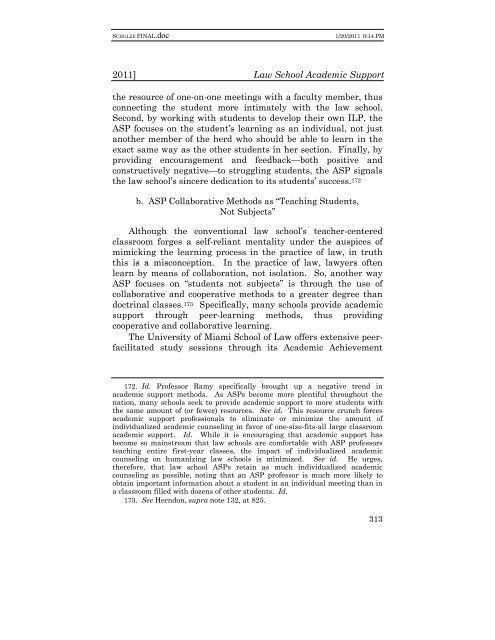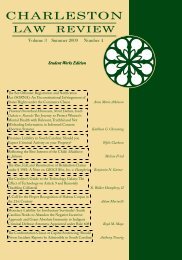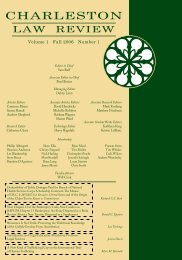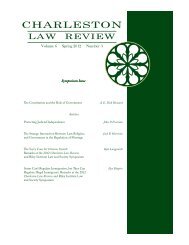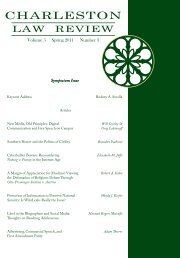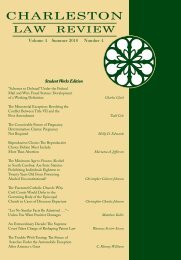Volume 5 Winter 2011 Number 2 - Charleston Law Review
Volume 5 Winter 2011 Number 2 - Charleston Law Review
Volume 5 Winter 2011 Number 2 - Charleston Law Review
You also want an ePaper? Increase the reach of your titles
YUMPU automatically turns print PDFs into web optimized ePapers that Google loves.
SCHULZE FINAL.doc1/20/<strong>2011</strong> 6:14PM<strong>2011</strong>] <strong>Law</strong> School Academic Supportthe resource of one-on-one meetings with a faculty member, thusconnecting the student more intimately with the law school.Second, by working with students to develop their own ILP, theASP focuses on the student’s learning as an individual, not justanother member of the herd who should be able to learn in theexact same way as the other students in her section. Finally, byproviding encouragement and feedback—both positive andconstructively negative—to struggling students, the ASP signalsthe law school’s sincere dedication to its students’ success. 172b. ASP Collaborative Methods as “Teaching Students,Not Subjects”Although the conventional law school’s teacher-centeredclassroom forges a self-reliant mentality under the auspices ofmimicking the learning process in the practice of law, in truththis is a misconception. In the practice of law, lawyers oftenlearn by means of collaboration, not isolation. So, another wayASP focuses on “students not subjects” is through the use ofcollaborative and cooperative methods to a greater degree thandoctrinal classes. 173 Specifically, many schools provide academicsupport through peer-learning methods, thus providingcooperative and collaborative learning.The University of Miami School of <strong>Law</strong> offers extensive peerfacilitatedstudy sessions through its Academic Achievement172. Id. Professor Ramy specifically brought up a negative trend inacademic support methods. As ASPs become more plentiful throughout thenation, many schools seek to provide academic support to more students withthe same amount of (or fewer) resources. See id. This resource crunch forcesacademic support professionals to eliminate or minimize the amount ofindividualized academic counseling in favor of one-size-fits-all large classroomacademic support. Id. While it is encouraging that academic support hasbecome so mainstream that law schools are comfortable with ASP professorsteaching entire first-year classes, the impact of individualized academiccounseling on humanizing law schools is minimized. See id. He urges,therefore, that law school ASPs retain as much individualized academiccounseling as possible, noting that an ASP professor is much more likely toobtain important information about a student in an individual meeting than ina classroom filled with dozens of other students. Id.173. See Herndon, supra note 132, at 825.313


